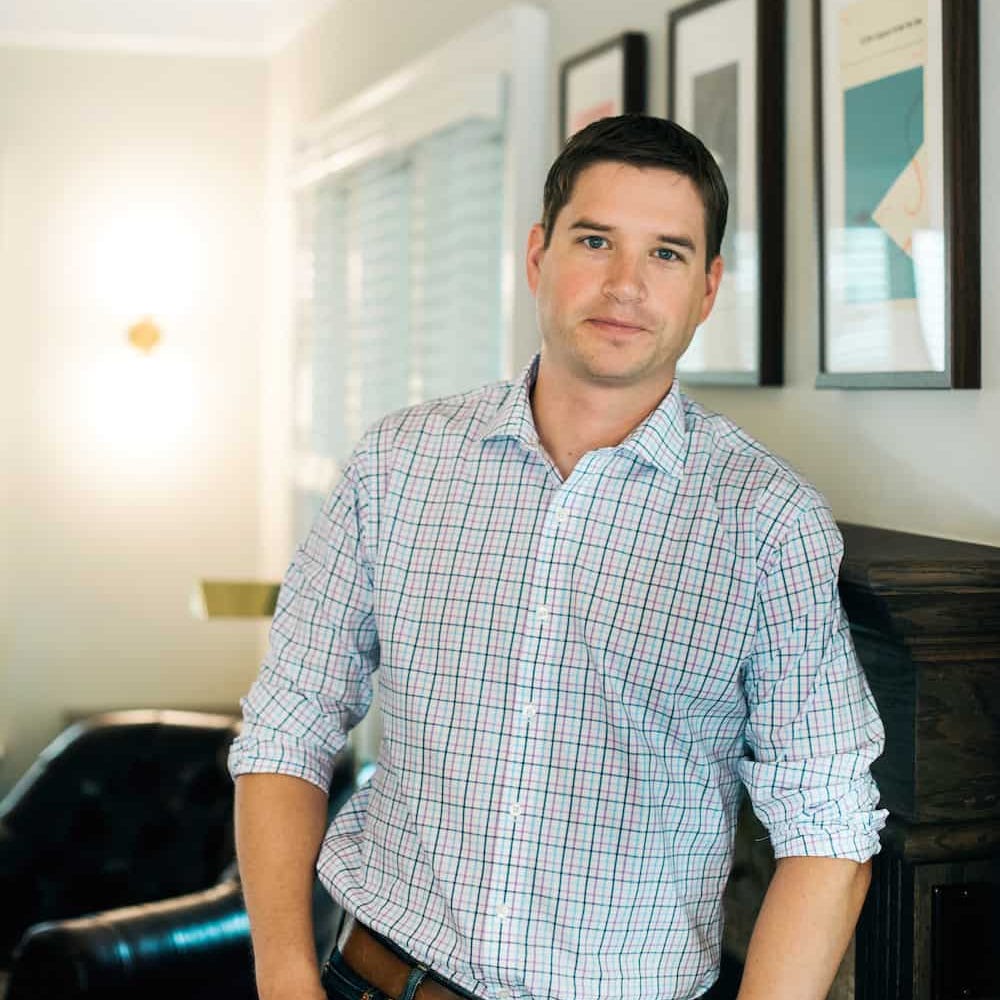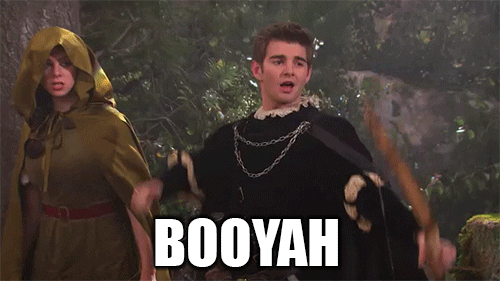Meet My Friend, Cal
Making your life better by seemingly ruining it.
We've officially hit triple digits!!! Huge props to the 11 of you that jumped in since the last intro. You're joining a fun and curious community of 109 folks. I can't thank you enough!
If this was forwarded to you, you can jump in by lightly stomping the button below:
intro exists to make your life better by introducing you to great things and helping you implement them.
Cal Newport doesn't seem like a bad guy. I mean, just look at him.
But he's on a mission to make your life better by seemingly ruining it. Yep, you just read that right. Newport boldly smashes popular ideas-- ideas that most of us accept without a second thought. Then, he replaces them with alternatives that initially look hard and unattractive, but have a profoundly positive effect over time.
If intro is all about making your life better by introducing you to great things, you have to meet Cal (oh yeah, we’re on a first name basis…he just doesn’t know it yet).
Here’s what you can expect in this introduction:
Who in the world is Cal Newport?
What are his “mic drop” ideas?
Why should you listen to him?
In this short email, you’re going to get a snapshot into Cal’s three most recent books and one, big, countercultural idea from each. But before we get there.
[1] Who in the World is Cal Newport?
Cal is a professor of Computer Science at Georgetown University. I'll spare you the juicy details of his resume (it’s long and impressive). But somehow, without the fanfare of social media or an electric personality, Cal has managed to excel in his primary career (the dude got tenured at the age of 35!), and wrote six books, one of which is a New York Times bestseller. Oh yeah, AND he’s married and has three kids.
It’s cool and all to be a successful professor and writer at a young age. It’s even more impressive to do those things while maintaining a solid family life.
[2] What are His “Mic Drop” Ideas?
I was introduced to Cal around 2015. It wasn’t long before I realized Cal had a way of sayings that sound unpopular but are unusually insightful. Little did I know that he’d been writing like this for years.
Don't Follow Your Passions
Cal wrote a trio of books 10 years earlier aimed at helping students dominate school. His study hacks bucked conventional wisdom and provided streamlined ways to rise above the rest. Then, in 2012, he wrote a book titled So Good They Can’t Ignore You that contradicted what most were saying: don't follow your passions.
What, Cal? Come again? Don't follow your passions?! Everyone says the way to have a happy, fulfilled life is to follow your passions.
Steve Jobs, in one of the most famous commencement speeches of modern history, urged new grads to pursue their dreams, saying :
Your work is going to fill a large part of your life, and the only way to be truly satisfied is to do what you believe is great work. And the only way to do great work is to love what you do. If you haven’t found it yet, keep looking. Don’t settle. As with all matters of the heart, you’ll know when you find it.
Notice what Jobs' advocates: great work is work you love. And how do you find this work that you love? By looking.
But what if you look and can't find it? Just keep looking. Keep holding out for that job that makes your dreams come true. Someday, you will find it, and once you do, you will live happily ever after.
In contrast, Cal argues that following your passions will leave most people searching endlessly and terribly unsatisfied. Our idealistic dreams are a bad gauge for determining our life work. Cal, instead, advocates developing skills that are valuable in the workplace. As you hone your skill over time, you’ll find increasing joy and passion around it.
It’s a shift from the “passion mindset” (I’ll only do what I love) to the “craftsman mindset” (I’ll work hard at something and will likely develop a love for it as I become good at it). Worthwhile work over time produces valuable skills, which leads to passion.
Worthwhile Work + Time = Valuable Skills → Passion
To Get Ahead, Learn to Focus
My pull into Cal’s orbit came when he talked about the key competitive advantage in the workplace. He called it "deep work" and wrote an entire book with the same title.
In Deep Work, Cal unpacks that most knowledge-based workers think busyness is the same as productivity.
Busy ≠ Productive
Many of us go through our day in a chaotic mess of emails, meetings, messages, dings, and dongs and whatever else. Our days are packed, our brains are fried, and yet, we get to the end wondering if we have anything worthwhile to show for all that stress. Can I get an amen?
This is all shallow work. Responding to the constant stream of inputs is shallow. It’s not demanding, very task oriented, and often performed while distracted. And yet, most of our days are filled with it.
The solution, my friends, is deep work. Cal defines deep work as:
DEEP WORK: Professional activities performed in a state of distraction-free concentration that push your cognitive capabilities to their limit. These efforts create new value, improve your skill, and are hard to replicate. (Deep Work, 3)
In short, deep work is the ability to "concentrate on a demanding task without distraction." (source)
I read Deep Work shortly after taking in Angela Duckworth's book Grit: The Power of Passion and Perseverance. Duckworth defines grit as:
GRIT: Passion and perseverance for long-term goals. (source)
Grit and deep work both have the elusive sticking-it-out-over-a-long-period-of-time ability. It's one thing to be interested in something. It's semi-easy to get pumped about a topic for a minute, or even a month. Some might even take a few steps down the road. (Cue 7th grade Josh who thought being a drummer only entailed getting some sticks and a set. After two weeks of lessons, my drumming career was over. Who knew you had to practice so much?!)
But, deep work over a long period of time gets you from novice status all the way to proficient (and even further). It's what helps a person learn how to bake a fluffy loaf of bread with a perfectly crusty exterior, even though it takes months of getting flour all over the kitchen and completely failing loaf after loaf. Deep work is the ability to stay on the task you know is most important, even though everything in you wants to check your email or social media (for just a quick minute, of course).
Deep work produces a satisfaction that can't be matched. Yeah, watching random Youtube videos can be fun and mindlessly entertaining in the moment. But after an hour, you don't feel any better about yourself. On the other hand, after pressing in on a hard task with focused perseverance, pushing the boulder one more foot up the mountain, gives you a distinct sense of accomplishment.
Even as I write this, I feel the pull. I know I should be writing. It's good work. But I just got a ping on my Teams chat and I feel the pull to read the note and respond. It feels good, after all, to get the momentary satisfaction of checking something off the list, even if it keeps me from something more important.
So how in the world do you sustain a laser focus on a challenging task or topic that you know will take you days, weeks, months, maybe even years? You may think you’re not smart enough for deep work or that your attention span is shot. Or that you’ve got a million things to juggle, things at home and at work, tasks, reports and responsibilities that need to be addressed. Deep work feels impossible.
I’ve got some good news for you.
You can learn to do deep work.
That’s what both Cal and Angela conclude: you can learn to do deep work or have grit. Deep work isn't a gift for just a select few. It's a skill that can be honed.
Cal’s Deep Work is a perfect follow-up to his earlier book, So Good They Can't Ignore You. Learn how to do deep work and over time you’ll become a master. Mastering something produces passion. Deep work actually helps you love what you do.
But Deep Work leaves you with a major dilemma: how in the world can we cultivate the ability to do deep work when our lifestyle outside of work (and often inside of it) is one big distracted jumble?
Your Technology Controls You More than You Think.
It sounds harsh to say your technology controls you. But for most of us, this blunt statement is true.
How can you focus at work when you spend your entire "normal" life distracted like crazy? Cal’s answer to honing the skill of deep work is to become a digital minimalist. And, of course, he wrote a book, called… can you guess?
Digital Minimalism came out in 2017 as a rallying cry to carefully choose the technology that you allow into your life (rather than taking it all in and assuming it’s all good). Cal’s strong critique and call to disconnect from the normal trends of society was startling then and still is now.
Cal advocates having no social media, limiting your internet use, and going on a 30-day digital declutter to fast from all things digital (that won't leave you unemployed). Then, once the declutter is complete, only add things back into your life that align with and promote your values. Get rid of the rest and gladly miss out on stuff.
While Deep Work gave me some helpful tips (which I'll share in a follow-up email later this week), Digital Minimalism rocked me.
I'm getting more and more distracted as the years go on. My ability to focus and read is shrinking. When I encounter a challenge in a project, my instinct is to break for a snack or check email.
After completing the 30-day digital declutter, I couldn't believe how much my smartphone had affected my life. My digital world had become like a third arm, always with me, no matter what. I almost felt naked without my phone. I didn’t realize how often I’d glance at it, infuse any down time with checking something on it, and feel oddly vulnerable when I didn’t have it in my pocket.
There are many who talk about the negative effects of social media and the way technology has crept into every corner of our lives. It's become a fairly accepted idea in the last several years. Few, though, actually have guts to advocate drastic change.
But that doesn't stop Cal. He champions minimalist approach to technology, only keeping what has a specific purpose. The rest, get rid of completely or put firm boundaries around it.
Cal wants us to have a controlled, purposeful relationship with technology, both inside and outside of work.This produces unbelievably valuable things like the ability to be bored and the goodness of deep work that leads to increasing joy.
[3] Why Should You Listen to Him?
Cal’s looking at the landscape and seeing people flounder left and right. His books are advocating for a better, deeper, more satisfying life. Getting a better life isn't easy. It requires saying no to mediocre and even good things (especially in the digital space). It requires developing a habit of pressing into work that is challenging and stretching. It requires shaping our personal and professional life around our deepest values and biggest dreams.
Cal (and I) want you to have a better life. But he knows that you need to hear, and do, some hard things to get it. Is it worth it? Totally! Is it easy? Not a chance.
Later this week I'll drop you an email that's full of actionable takeaways to live the deeper, richer life.
Key Resources + Some Randomness
You can find all of Cal's books here. And if you want to do a super deep dive into all his interviews, podcasts, articles and more, you're welcome.
Cal's got his own podcast. The podcast is alright, but focused on folks that already love what Newport is doing and want to go deeper. I definitely wouldn't start here. But, after reading his stuff, if you want to get into the weeds, this could be fun.
Angela Duckworth deserves her own email. To get a feel for her book, Grit, listen to her TED Talk.
For an entertaining and insightful look into how hard it is to focus, check out Tim Urban's article, "Why Procrastinators Procrastinate.
I've never seen a Mr. Beast Youtube video. Supposedly he's a big deal. But I did watch these guys break down why Mr. Beast dominates Youtube. The simple answer: he creates varying levels of tension every six seconds. Imagine what happens to a person's brain if they are trained to be surprised every six seconds? Talk about a deep work killer.
I always love feedback and perspective. If you've got thoughts, just hit reply and let me know.
And, want to intro me to something that's really helped you? Drop me a note.
Look out for an email later this week with my top five actionable takeways from Cal. They are game-changers!
Have a solid week,
Josh
PS Did someone forward this to you? Subscribe here.




